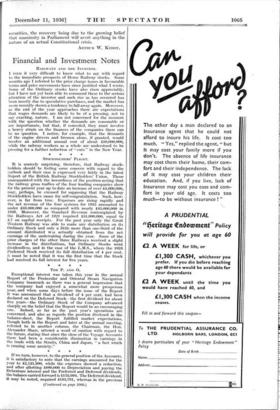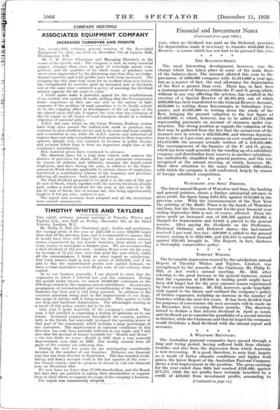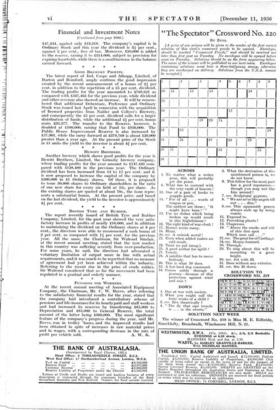Financial and Investment Notes
RAILWAYS AND THE INVESTOR.
I FIND it very difficult to know what to say with regard to the iinejediate prospects of Home Railway stocks. Some months ago I referred to the prior charge issues in favourable terms and price movements have since justified what I wrote. Some of the Ordinary stocks have also risen appreciably, but I have not yet been able to commend these to the serious attention of the investor and such rise as has occurred has been mostly due to speculative purchases, and the market has more recently shown a tendency to fall away again. Moreover, as the end of the year approaches there are expectations that wages demands are likely to be of a pressing, not to say exacting, nature. I am not concerned for the moment with the question whether the demands are reasonable or are importunate, but that, if conceded, they must involve a heavy strain on the finances of the companies there can be no question. I notice, for example, that the demands of the engine drivers and firemen alone, if granted, would involve an additional annual cost of about 210,000,000, while the railway workers as a whole are understood to be pressing for a further reduction of "cuts" in the New Year.
* *. * * STOCKHOLDERS' PLIGHT.
• It is scarcely surprising, therefore, that Railway stock- holders should be feeling some concern with regard to the outlook and their cage is expressed very fairly in the latest Report of the British Railway Stockholders' Union. Those unacquainted with the inwardness of the position noting that the railway gross traffics of the four leading companies show for the present year up to date an increase of over 24,000,000, may, perhaps, be excused for supposing that the Railway Stockholders have cause for self-congratulation. Such, how- ever, is far from true. Expenses are rising rapidly and the net revenue of the four systems for 1935 amounted to under 233,000,000 as compared with nearly 245,000,000 in 1929. Moreover, the Standard Revenue contemplated by the Railways Act of 1921 required 251,000,000, equal to 4.7 on capital receipts. For the past year only the Great Western Railway was able to make any distribution on its Ordinary Stock and only a little more than one-third of the amount distributed WAS actually obtained from the net earnings of the undertaking during the year. Some of the prior charges of the other three Railways received a slight increase in the distributions, but Ordinary Stocks went dividendless, and in the case of the L.M.S., where the 1923 Preferred Stock received its full distribution of 4 per cent. it must be noted that it was the first time that the Stock had received its full interest for five years.
* * * *
THE P. AND 0.
Exceptional interest was taken this year in the annual Report of the Peninsular and Oriental Steam Navigation Company inasmuch as there was a general impression that the company had enjoyed a somewhat more prosperous year, and when some days before the issue of the Report it was announced that a dividend of 4 per cent, had been declared on the Deferred Stock—the first dividend for about five years—the Ordinary Stock of the Company advanced sharply on the belief that the Report would be an encouraging one. Indeed, so far as the past year's operations are concerned, and also as regards the position disclosed in the balance-sheet, the Report fulfilled market expectations, though both in the Report and later at the annual meeting, referred to in another column, the Chairman, the Hon. Alexander Shaw, uttered a .word of caution with regard to the future, stating that since the close of the Voyage Accounts there had been a considerable diminution in earnings in the trade with the Straits, China and Japan, "a fact which is causing some anxiety."
* * . * * If we turn, however, to the general position of the Accounts, it is satisfactory to note that the earnings amounted for the year to 12,121,990, while the expenses showed a reduction, and after allotting 2880,000 to Depreciation and paying the Debenture interest and the Preferred and Deferred dividends, the balance carried forward is 2152,094. The Deferred dividend, it may be noted, required 1183,701, 'whereas in the previous
(Continued on page 1066.)
Financial and Investment Notes
(Ccmlinued from page 1085.) year, when no dividend was paid on the Deferred, provision for depreciation made it necessary to transfer £450,000 front Reserve—a course which has not had to be pursued this year. * * * * THE BALANCE-SHEET.
The most interesting development, however, was the change which has taken place in some of the main items of the balance-sheet. The amount allotted this year to De- preciation of £880,000 compares with £1,314,000 a year ago, but, as a matter of fact, the real allowance for depreciation
of the fleet is greater than ever. There has, in fact, been a rearrangement of finances within the P. and 0. group which, without in any way affecting the services, has resulted in the creation of a Special Reserve of £6,481,484, out of which /300,000 has been transferred to the General Reserve Account, 1250,000 to writing down Investments in Subsidiary Com- panies, and £5,931,000 to writing down the whole of the fleet, bringing the present valuation to the low figure of 15,695,000, to which, however, has to be added £1,731,000 representing payments on account of steamers under con- struction. The strong position as regards the valuation of the fleet may be gathered from the fact that the actual cost of the steamers now in service is 122,626,000, and whereas deprecia- tion to date at 5 per cent, per annum on cost would amount to £12,613,000, the amount actually written off is 116,931,000. The rearrangement of the finances of the P. and 0. group, which has been made possible by the winding up of a subsidiary company and distribution from reserves in another subsidiary, has undoubtedly simplified the general position, and this was recognised at the annual meeting, at which, however, Mr. Shaw drew attention " to the many formidable difficulties with which the company is still confronted, largely by reason of foreign subsidised competition.
* * * *
WATERLOW AND SONS' PROFITS. • The latest annual Report of Waterlow and Sons, the banking and general printers shows a further substantial advance in gross profit, the figure being 1181,954, against 1152,663 in the previous year. With the commencement of the New Year the printing of the Radio Times is in the hands of Waterlow and Sons, but the Revenue Account for the past financial year ending September 30th is not, of course, affected. From the gross profit an increased sum of £66,503 against 150,382 is charged for depreciation and £4,041 is placed to the general reserve. After paying the dividends on the Preference, Preferred Ordinary and Deferred shares—the last-named received 5 per cent, less tax-120,000 is added to the general reserve, raising it to £325,000, and £32,515 is carried forward against £28,861 brought in. The Report, in fact, discloses a thoroughly conservative policy.
* * * *
TIMOTHY WHITES.
The favourable impression created by the satisfactory annual Report of Timothy Whites and Taylors, Limited, was strengthened by the remarks of the Chairman, Mr. Philip E. MB, at last week's annual meeting. Mr. Hill, after referring to the great increase in the general turnover, stated that the expansion of £49,000 in trading profit might have been still larger but for the poor summer season experienced by their seaside branches. Mr. Hill, however, spoke hopefully with regard to the future and outlined the company's policy of further expansion, including an increase in the number of branches within the next few years. It has been decided that for purposes of convenience the next accounts will be made up to December 31st, covering fifteen months. The directors intend to declare a first interim dividend in April as usual, and the Board are to considerthe possibility of a second interim in October, while the Chairman said that he hoped the company would distribute a final dividend with the annual report and accounts.
* * * * A WELCOME RECOVERY.
The Australian pastoral companies have passed through a long and trying period, having suffered both from climatic troubles and also from the depression from which Australia is now recovering. It is good, therefore, to note that, largely as a result of better climatic conditions and higher wool prices, the latest Report of the Australian Pastoral Company shows a real improvement in the position. The gross earnings for the year ended June 30th last reached £129,460, against £77,517, while the net profits have certainly benefited by a credit of 116,632 from investment profits, amounting to (Continued on page vi.)
Financial and Investment Notes (Continued from page 1066.) 147,244, against only £18,218. The company's capital is in Ordinary Stock and this year the dividend is al per cent., against 2 per cent., free of tax. Moreover, 110,000 is added to the reserve, raising it to 1314,000, subject to provision for expiring leaseholds, while there is a small increase in the balance carried forward.
GOOD BREWERY PROFITS.
The latest report of Ind, Coope and Allsopp,. Limited, of Burton and Romford, amply confirms the good impression created by the recent announcement of a bonus of 2i per cent, in addition to the repetition of a 25 per cent. dividend. The trading profits for the year amounted to 1768,621 as compared with 1567,463 for the previous year, while dividend and other revenue also showed an increase. It will be remem- bered that additional Debenture, Preference and Ordinary Stock was issued last April in connexion with the acquisition of licensed properties from Nalder and Collyer's Brewery, and consequently the 25 per cent. dividend calls for a larger distribution of funds, while the additional 21 per cent, bonus costs 183,277. The transfer to the Reserve, however, is doubled at /100,000, raising that Fund to /950,000. The Public House Improvement Reserve is also increased by £57,901, while the carry forward at 1379,768 is about /20,000 greater than a year ago. At the present price of the Stock in /1 units the yield to the investor is about 41 per cent.
HEWITT BROTHERS.
Another brewery which shows good profits for the year is Hewitt Brothers, Limited, the Grimsby brewery company, 'whose trading profits for the year amount to 1147,428 com- pared with 1128,480 in the previous year. The Ordinary dividend has been increased from 14 to 15 per cent, and it is now proposed to increase the capital of the company by £200,000 in 11 Ordinary shares. Of these, it is proposed to issue 50,000 shares to Ordinary shareholders in the ratio of one new share for every six held at 55s. per share. As the existing shares are quoted at about 70s.; the issue repre- sents a substantial bonus. At the present price, and based on the last dividend, the yield to the investor is approximately 41 per cent.
BRITISH TYRE AND RUBBER.
The report recently issued of British Tyre and Rubber Company, Limited, for the past year showed the very satis- factory increase in profits of nearly 116,000, and in addition to maintaining the dividend on the Ordinary shares at 8 per cent., the directors were able to recommend a cash bonus of 2 per cent, as compared with 11 per cent. for the previous year. All the same, the Chairman, Sir Walrond Sinclair, at the recent annual meeting, stated that the tyre market in this country was suffering severely from over-production. For some years, he said, the directors had advocated a voluntary limitation of output more in line with actual requirements, and it was much to be regretted that no measure of agreement had yet been achieved within the industry. Referring to the recent rise in the price of crude rubber, Sir Walrond considered that so far the movement had been regulated in a gradual and orderly manner.
PENSIONS FOR WORKERS.
At the recent annual meeting of Associated Equipment Company, the Chairman, Mr. C. W. Reeve, after referring to the satisfactory financial results for the year, stated that the company had introduced a contributory scheme of pensions and life-insurance for its hourlypaid.and staff workers and had increased its reserves by transferring 165,000 to Depreciation and £85,000 to General Reserve, the total amount of the latter being 1860,000. The most significant feature of the company's progress during the year, said Mr. Reeve, was in trolley 'buses, and the improved results had been obtained in spite of increases in raw material prices and in wages, with a corresponding decrease in the rate of


















































 Previous page
Previous page